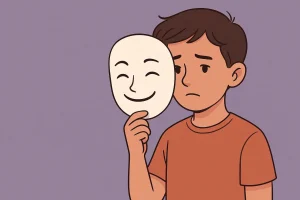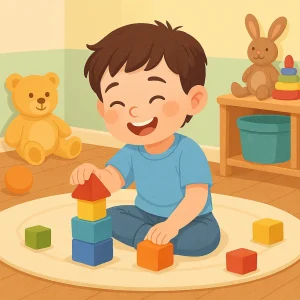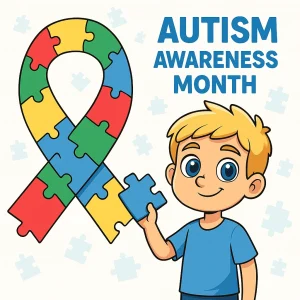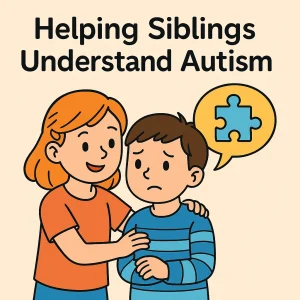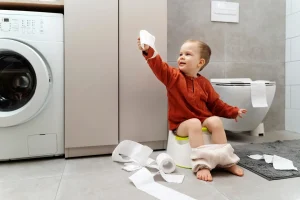How to Spot Autism Symptoms in 2-Year-Old
By Rajini D
Last Updated: October 25, 2024
Recognizing the early signs of autism in toddlers can feel like a daunting task, especially when every child develops at their own pace. At age 2, it’s natural for parents to wonder about their child’s growth milestones and social behaviors. Some toddlers may be quick to speak and engage, while others take a bit more time. But how do you know when certain behaviors might signal something more?
In this guide, we’ll look at signs that could indicate autism in a 2-year-old, offering practical insights that can help you feel more informed. Recognizing these early signs matters because early intervention can make a significant difference in a child’s communication, social skills, and overall development. Taking proactive steps to understand your child’s needs can lead to a supportive environment where they can thrive.

What Are the Early Signs of Autism in a 2-Year-Old?
Recognizing the early signs of autism in a 2-year-old can feel overwhelming, but understanding these key areas—communication, behavior, and social interaction—can provide clarity and support for parents and caregivers.
Communication Delays in 2-Year-Olds
One of the first areas where parents may notice differences is in communication. While children vary in how they pick up language, here are some common signs of autism related to speech and language in toddlers:
- Delayed spoken language: A 2-year-old may use fewer words or struggle to combine words into short phrases, which are typical milestones for this age.
- Difficulty expressing needs: Without the words to communicate, toddlers may rely on actions like pointing or pulling. However, when those gestures don’t work, they may become frustrated, leading to tantrums or emotional outbursts.
- Limited use of gestures: Gestures like waving or pointing, which help children communicate before they can speak fluently, may be less common or absent in some toddlers with autism.
Behavioral Signs of Autism in Toddlers Age 2
Autism can also show up through unique behavioral patterns that may seem different from those of other children. Some common signs include:
- Repetitive behaviors: Toddlers may repeat actions like lining up toys, spinning objects, or rocking back and forth. These behaviors often serve as a source of comfort and predictability.
- Attachment to routines: Many children like routines, but a child with autism may become upset by small changes, such as a different breakfast or taking a new route home. These routines help them feel secure and in control.
Social Signs of Autism in 2-Year-Olds
Social interactions are often where parents first notice differences. While social milestones can vary, some behaviors may suggest autism:
- Avoiding eye contact: A 2-year-old with autism may avoid direct eye contact, which can make it challenging to connect socially.
- Preference for solitary play: Toddlers may show less interest in interactive play, preferring instead to play alone or focus on specific objects.
- Difficulty sharing or taking turns: Activities that require cooperation, such as sharing toys or taking turns, may be challenging, as these rely on understanding others’ perspectives.
Differences Between Speech Delays and Autism in 2-Year-Olds
It’s common for parents to worry if their 2-year-old has a speech delay, but it’s important to know that a delay in speaking doesn’t always mean autism. Many children experience some level of speech delay without other signs of autism. Let’s look at how to tell the difference.
Understanding Speech Delays vs. Autism-Related Language Delays
Speech delays can have various causes, such as hearing issues, developmental differences, or simply a child’s individual pace. Here’s how to recognize key differences between a typical speech delay and language delays that may indicate autism:
- Speech Delay:
- The child may be slow to begin speaking but shows signs of trying to communicate. They might point, gesture, or look toward objects or people to express needs.
- Often, children with simple speech delays engage socially by making eye contact, smiling, and interacting with others.
- They respond to their name and show interest in playing with others, even if they aren’t verbal yet.
Know more about Understanding Speech Delay: Causes, Milestones, and Therapy
- Autism-Related Language Delays:
- In addition to delayed speech, there may be limited social engagement, like avoiding eye contact or not responding to their name.
- Communication challenges may extend beyond speech, as toddlers with autism often don’t use gestures, pointing, or facial expressions to convey meaning.
- They may exhibit repetitive behaviors like repeating the same word or phrase, even when it doesn’t relate to the situation.
| Differences | Speech Delay | Signs of Autism in 2-Year-Old Toddlers |
|---|---|---|
| Social Interaction | Engages with others, makes eye contact | Avoids eye contact, minimal social cues |
| Communication Efforts | Uses gestures, responds to name | Limited gestures, may not respond to name |
| Language Use | Slow to speak but contextually appropriate | Repeats words or phrases without context |
Role of Speech Therapy for 2-Year-Olds with Autism
Speech therapy plays a vital role in supporting young children with autism, especially as they’re just beginning to learn how to communicate with the world. For toddlers, speech therapy is more than just learning words—it’s about connecting, understanding, and interacting in ways that feel comfortable and natural.
How Speech Therapy Supports Communication and Social Skills
For a 2-year-old with autism, expressing needs and understanding others can be challenging. Speech therapists are trained to help toddlers build both verbal and nonverbal communication skills in ways that align with each child’s unique development.
- Building Verbal Skills: Speech therapists work on helping children with word use, sentence formation, and even the basics of sounds and letters. For toddlers who may struggle with speech, therapy focuses on simple, everyday words that allow them to express themselves more clearly.
- Enhancing Nonverbal Communication: Nonverbal cues are a big part of how young children interact. Therapists help toddlers learn gestures, eye contact, and facial expressions that make communication easier, even without words.
- Developing Social Engagement: Therapists also guide children in interactive play, teaching them the basics of taking turns, sharing, and responding to others, which helps build early social skills.
Using Augmentative and Alternative Communication (AAC) Methods
For some toddlers with autism, verbal communication may be especially challenging. This is where Augmentative and Alternative Communication (AAC) methods come in, providing children with additional tools to express themselves.
Here are some commonly used AAC tools:
- Sign Language: Simple signs, like “more” or “help,” allow toddlers to communicate basic needs without speech. This can reduce frustration and give them a way to connect with others.
- Picture Exchange Communication System (PECS): With PECS, children can use pictures to communicate. For example, if they want a specific toy, they hand over a picture of the toy. This system builds a bridge to language by visually showing connections between words and objects.
- Communication Apps and Devices: Apps available on tablets or specialized speech devices allow children to select images, words, or phrases to express themselves. This method can grow with the child, giving them more options as they develop.
AAC Method Description Sign Language Basic signs for common needs (e.g., “more,” “please”) Picture Exchange Communication (PECS) Uses pictures to let toddlers communicate needs or desires Communication Apps & Devices Apps or devices that enable visual and verbal expression Conclusion
Watching your child’s development is essential for recognizing early signs of autism. If you see differences in their behaviors, language, or social interactions, it’s helpful to reach out to a professional. Early support can make a big difference, guiding your child’s growth in communication and social skills.
With resources and assessments, Wellness Hub is here to support parents. Explore our guides on milestones and interactive activities to help your child thrive. Remember, you’re not alone—small steps now can create a positive impact on your child’s future.
Frequently Asked Questions:
1. What are the early signs of autism in a 2-year-old?
Early autism signs in 2-year-olds may include limited eye contact, repetitive actions like hand-flapping or spinning, speech delays, and a preference for playing alone. Toddlers might also seem resistant to changes in daily routines. Recognizing these signs early can help in seeking support if needed.
2. How do I know if my 2-year-old has autism or a speech delay?
Speech delays can exist on their own, but autism-related language delays often come with social challenges. Look for signs like avoiding eye contact, limited gestures, or not responding to their name. A professional evaluation can clarify any concerns about speech versus autism.
3. Can autism be diagnosed at 2 years old?
Yes, autism can often be diagnosed at age 2, though some signs might appear earlier. Specialists observe a child’s social, communication, and behavioral patterns to make a reliable diagnosis. Early diagnosis allows families to access support and resources sooner.
4. What should I do if I think my toddler shows signs of autism?
If you’re noticing signs of autism in your toddler, consider speaking with a pediatrician or developmental specialist. They can guide you in understanding your child’s needs and next steps. Early support can positively impact a child’s communication and social skills.
5. How can speech therapy help a 2-year-old with autism?
Speech therapy helps toddlers with autism by developing both verbal and nonverbal communication skills. Therapists work on expressing needs, making eye contact, and understanding social cues. It’s a key way to boost interaction and confidence at a young age.
6. Does a speech delay mean my child has autism?
A speech delay doesn’t always mean autism; some children just take more time with language. However, autism-related speech delays usually come with additional social or behavioral signs. If unsure, a speech therapist or specialist can assess for both.
7. What are repetitive behaviors in toddlers with autism?
Repetitive behaviors are common in toddlers with autism and can include actions like hand-flapping, lining up toys, and repeating phrases. These behaviors often provide comfort or sensory stimulation. Recognizing them can be an important step in understanding autism signs.
8. How can I support my 2-year-old with autism at home?
At home, structured routines and play-based learning activities can support your toddler’s development. Augmentative tools, like sign language or picture exchange systems, can also help them communicate. Resources from Wellness Hub offer ideas for supportive home activities.
9. Is it common for toddlers with autism to prefer being alone?
Yes, many toddlers with autism prefer solitary play and might avoid group activities. They may show more interest in objects or specific activities than in interacting with people. Providing structured social interactions can help them gradually build social skills.
10. Where can I find resources to help my 2-year-old with autism?
Wellness Hub offers resources, including guides and activities, to support developmental milestones for toddlers with autism. Parents can find tips on communication, routines, and early intervention strategies. Accessing resources early can make a meaningful difference in your child’s growth.
About the Author:
Rajini Darugupally
M.Sc., Speech-Language Pathologist (9+ years of experience)
Rajini is a passionate and dedicated Speech-Language Pathologist with over 9+ years of experience, specializing in both developmental speech and language disorders in children and rehabilitation in adults. Driven by a desire to empower each individual to find their voice, Rajini brings a wealth of experience and a warm, genuine approach to therapy. Currently, at Wellness Hub, she thrives in a team environment that values innovation, compassion, and achieving results for their clients.
Book your Free Consultation Today
Parent/Caregiver Info:
Client’s Details:
* Error Message

